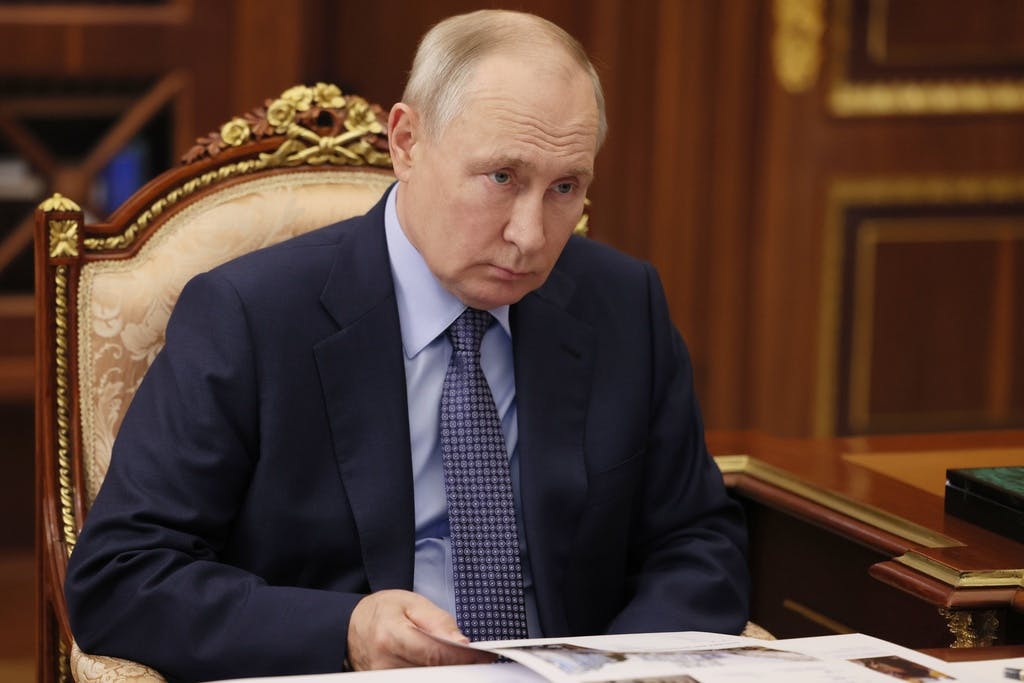Unrest in Breakaway Region of Moldova Could Be Part of Putin’s Grand War Strategy
‘All he really needs to do,’ one analyst tells the Sun, ‘is to create chaos in Moldova, Romania, and elsewhere and show that the West will fail to react — and for that he doesn’t need tanks and jets.’

If a breakaway Moldovan region falls and no one in the West hears it, does it make a sound? This take on the old adage could well describe a cornerstone of President Putin’s war strategy, hints of which may be gleaned when he addresses the Duma Thursday.
In what is widely seen as a Kremlin-orchestrated move, the leaders of the pro-Russia sliver of land in eastern Moldova, Transnistria, called on Moscow to help it fend off “economic pressure” from the government of Moldova’s president, Maia Sandu. Transnistria also gathered a “congress of deputies” to organize a referendum on secession.
A small country with a paltry economy that is situated between Romania and Ukraine, Moldova has long struggled to keep its eastern, pro-Russia tract of land under government control. The Europe-oriented President Sandu on Wednesday said she was committed to a “peaceful settlement” of the conflict.
Many in the West shrugged off Transnistria’s statement. The breakaway region’s plea fell short of calling Moscow to invade, and it did not declare itself part of mother Russia. This is widely seen as a local kerfuffle, a mere wrinkle in the saga of Transnistria’s battle against the pro-Western Ms. Sandu.
Another reason for the West to refrain from overreaction is that the Russian army, which is busy in neighboring Ukraine, is highly unlikely at this time to allocate resources to aid its Transnistrian ally militarily. The Russians have lost top naval assets in the Black Sea and have no incentive to use the remaining fleet to facilitate a Moldova invasion.
That sense of Western complacency, though, may well be part of Mr. Putin’s grand strategy. “All he really needs to do is to create chaos in Moldova, Romania, and elsewhere and show that the West will fail to react — and for that he doesn’t need tanks and jets,” a Europe watcher at the Foundation for Defense of Democracies, Ivana Strander, tells the Sun.
Mr. Putin will likely highlight the Transnistria call for Russian assistance when he addresses the Russian parliament, the Duma, on Thursday. He is also widely expected to talk about pro-Russian dissent in the Balkans and elsewhere in Europe, where the Kremlin has instigated unrest among Russian-speaking residents.
The Russian president could present the chaos, and the fact that it is unlikely to be challenged by NATO, as a Russian victory, Ms. Strander says. This year is marked by election contests in America, many European countries, and likely Britain. An already strong urge to avoid escalation with Russia at all cost will intensify in Western countries, she adds.
Case in point: During a late-night press conference Monday, President Macron of France said that his country would not rule out sending troops to aid Ukraine. The statement was typical of Mr. Macron’s tendency to be vague enough about raw ideas to allow him to quickly retreat from them.
Moscow relished it, though. “Before making such statements, it would be right for Macron to remember how it ended for Napoleon and his soldiers, more than 600,000 of whom were left lying in the damp earth,” the Duma chairman, Vyacheslav Volodin, said.
Nor were America and other Ukraine allies eager to back Mr. Macron. “There will be no U.S. troops on the ground in a combat role in Ukraine,” the National Security Council spokesman, John Kirby, stated flatly.
European countries were outraged. “What was agreed from the beginning,” Chancellor Scholz of Germany said, was that “there will be no soldiers on Ukrainian soil sent there by European states or NATO states.” Germany is emerging as the Western European country most eager to make a deal with Moscow for ending the war.
This week, Mr. Scholz closed the door on sending Taurus long-range missiles to the Ukrainian army, arguing it would turn Germany into a party to the war. Raising London’s ire, he also disclosed that British personnel are on the ground in Ukraine, launching long-range Storm Shadow missiles alongside Ukrainian troops.
Sensing Western hesitation about the war’s future, Mr. Putin is making use of Russian-speaking European allies, hoping the West will completely abandon Ukraine.
“Russia driven separatist Transnistrian region in Moldova gathers its ‘congress’ to probably signal one way or another its loyalty to the Kremlin exactly when US & EU stop or slowdown their support for Ukraine to levels that make Kyiv no longer effectively repelling invaders,” a former Moldovan ambassador to the United Nations, Vlad Lupan, wrote on X.
“When things escalate in Moldova and elsewhere in Europe, Putin can use the chaos as a bargaining chip and say, negotiate with me” over ending — and winning — the Ukraine war, Ms. Strander says.

